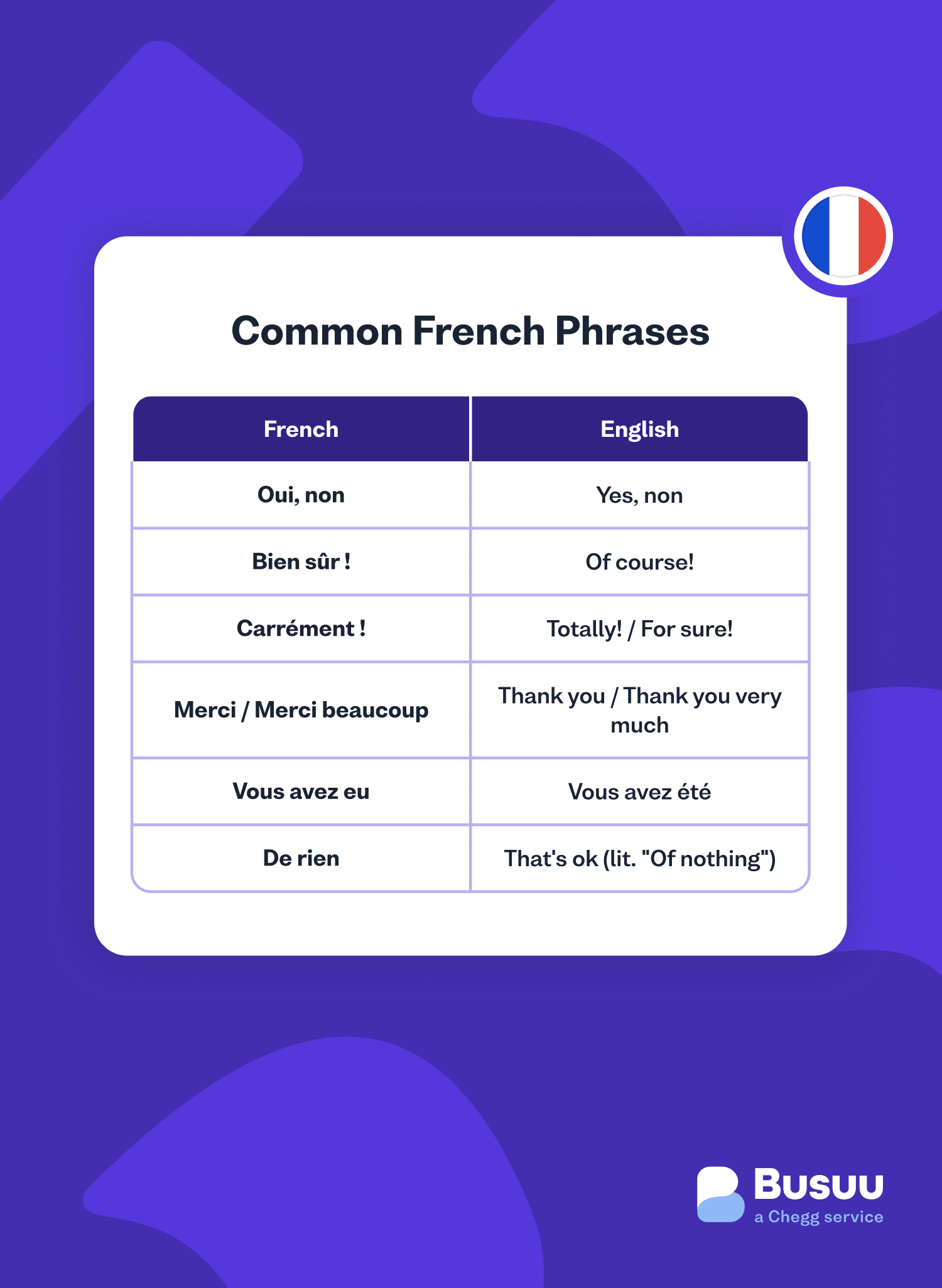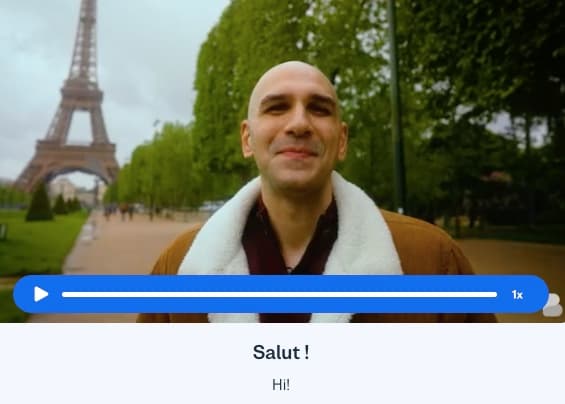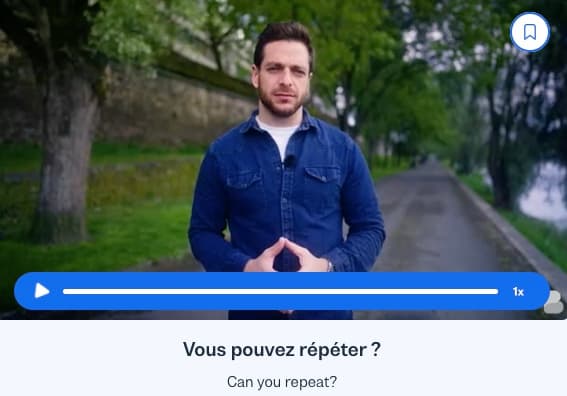I want to learn...
Author:

Laura Pennacchietti
Bonjour ! Did you know that France is the most visited country in the world? Millions of international tourists visit France every year, to experience the vibrant culture, magnificent sights and rich gastronomie that the country offers.
If you are planning to join the wave of tourists visiting France, it might be a good idea to learn a few phrases to get around Paris or Saint-Tropez, in order to be able to interact with the natives without having to answer "parlez-vous anglais? " every time someone speaks to you.
Or perhaps you are just trying to expand your French vocabulary repertoire, or impress a (very stylish) French acquaintance? Check out this handy list of French phrases, and start conversing like a real native!
Greetings in French
Any conversation starts with a greeting, so this is the perfect way to start our list of phrases! Every greeting will include a short explanation, as their use is less obvious than it could seem.
Tip: Do you need a refresher of French pronunciation rules? Mais oui, we’ve got you covered - check out our practical guide on French pronunciation!
And now, let’s get started!
1. Bonjour - Good morning
This is by far the most common French greeting, and can be used in formal and informal situations - although it’s more common in formal contexts.
2. Bonsoir - Good evening
Similar to “bonjour”, but used towards the end of the day, from about 5 pm onwards.
3. Salut - Hello / bye
The most versatile French greeting. More informal than “bonjour” and “bonsoir”, but not too casual, can be used both when you arrive or start a conversation, and when you leave.
4. Coucou ! - Hey!
This is a warm and cute greeting, which would normally be used with friends and close family. It’s definitely casual, and not to be used in a professional or formal context.
5. Bonne journée - Have a good day
You can use this when you leave or end a conversation, to wish the other person a nice day. Tip to sound like a native: remember the difference between “bonjour” and “bonne journée” - one starts a conversation, the other one ends it; one is for when you arrive, the other one for when you leave.
6. Bonne soirée - Have a good evening
Similar to“bonne journée”, but used towards the end of the day, from around 5 pm onwards. The same difference applies as for bonjour vs. bonne journée: “bonsoir” is for when you arrive or start a conversation, and “bonne soirée” for when you leave or end a conversation.
7. Au revoir - Goodbye
It’s a formal greeting, used when leaving or ending a conversation in a formal or professional context.
8. Tchao - Bye!
This comes from the Italian “ciao”, but in French it is used only when leaving or ending a conversation. It’s more informal than “au revoir”.
9. À plus - See you later
This is a more casual and slangy greeting, used with family or friends that you think you’ll see again soon.
10. À la prochaine - See you next time
Also quite informal.
11. Bonne nuit - Good night
An appropriate greeting to conclude our list - this is used only when going to sleep, as a parting salutation.
Common French phrases
Here's a few phrases that you're likely to use all the time. Learn them par coeur!

Oui, non - Yes, no
Used to answer a question positively or negatively.
2. Bien sûr ! - Of course!
A more emphatic “oui”.
3. Carrément ! - Totally / For sure!
A more slangy version of “bien sûr”.
4. Merci / Merci beaucoup - Thank you / Thank you very much
Used to express gratitude in any situation.
5. Je vous remercie - Many thanks (lit. “I thank you”)
A more formal way of saying“merci”.
6. De rien - That's ok (lit. "Of nothing")
A short and common answer to"merci".
7. Je vous en prie / Il n’y a pas de quoi - You're welcome
Two more formal and polite phrases to respond to"merci".
8. Pardon - Sorry
Used both to apologize and to politely attract someone's attention.
9. Excusez-moi - Excuse me
Similar to"pardon", but more formal.
10. S'il te plaît / S'il vous plaît - Please
The first one is formal and the second one is informal.
11. Je ne sais pas - I don't know
12. Je ne comprends pas - I don't understand
Conversational French phrases
Here's a few phrases to make your conversations flow really smoothly!
As a general rule, bear in mind that French has two different subject persons used to speak formally and informally: "vous" (formal) and "tu" (informal), so the same sentence can have two different versions (e.g. Comment allez-vous / Comment vas-tu? - How are you?).
Questions and phrases with "vous" are formal, and those with "tu" are informal.
Enchanté(e). - Nice to meet you.
Je m'appelle… - My name is…
Comment vous appelez-vous / Comment tu t'appelles ? - What's your name?
Ça va ? - How are you?
Here's the more common and neutral way of asking how things are going, and start a conversation.
5. Comment allez-vous ? - How are you?
This is the more formal and elegant version.
6. Ça marche ? - How's it going?
This is a slangy and casual phrase that will make you sound like a native - but remember it’s only for very informal situations!
7. Ça va / Je vais bien. - I'm alright.
8. Et vous / Et toi ? - And you?
You can use this to easily reverse a question to the person you're speaking with, formally or informally.
9. Quel âge avez-vous ? / Quel âge as-tu ? - How old are you?
10. J’ai… ans. - I am… years old.
Example: J’ai 35 (trente-cinq) ans. - I am 35 years old.
Tip: Need a little revision of French numbers? We’re on it - check out our article on French numbers!
11. D’où venez-vous ? Tu viens d'où ? - Where are you from?
12. Je suis… / Je viens de… - I am… / I am from…
Example 1: Je suis américain(e) / russe / brésilien(ne). - I am American / Russian / Brazilian.
Example 2: Je viens de New York / Moscou / Rio de Janeiro. - I am from New York / Moscow / Rio de Janeiro.
Use the first phrase to express your nationality, and the second one to say which city you are from.
13. Que faites-vous dans la vie ? (formal) / Tu fais quoi dans la vie ? (informal) - What’s your job?
You can use both of these phrases to ask someone about their job, but the second one is informal and a bit casual.
French travel phrases
Now, a few phrases that will make traveling to France much easier! Most of these are in the formal "vous" rather than in the informal,"tu", because you’re likely to have to say them to strangers.
Parlez-vous anglais ? - Do you speak English?
Hopefully you won’t have to use this too often, but if you're really lost, it might be best to find someone who speaks English.
2. Je parle un peu français. - I speak a little French.
You can say this to let the other person know that you'd like to practice your French, but your level is not super advanced.
3. Pouvez-vous parler plus lentement ? - Could you speak slowly?
4. À quelle heure…? - What time…?
Example 1: À quelle heure est le départ ? - What time is departure?
Example 2: À quelle heure dois-je quitter ma chambre ? - What time do I need to leave my room?
5. Où est / où sont…? - Where is / where are…?
Example 1: Où est la gare / l'hôpital / la plage ? Where is the station / the hospital / the beach?
Example 2: Où sont les toilettes ? Where is the toilet?
Tip: Use "où est…" for singular things (e.g. the station) and "où sont…" for plural things (e.g. the toilet, which is plural in French).
6. Est-ce qu'il y a un/une… près d'ici ? - Is there a … near here?
Example: Est-ce qu'il y a un supermarché / un distributeur automatique / une pharmacie près d'ici ? - Is there a supermarket / an ATM / a pharmacy near here?
7. Pouvez-vous…? - Could you…?
Example 1: Pouvez-vous m'appeler un taxi ? - Could you call me a taxi?
Example 2: Pouvez-vous m'aider ? - Could you help me?
Use this every time you need to politely ask someone to do something for you.
8. Je cherche… - I am looking for…
Example: Je cherche la réception / l’ambassade anglaise / Monsieur Dupont / un maillot de bain. - I am looking for the reception / the English embassy / Mr Dupont / a swimming costume.
You can use this phrase when looking for a place, but also a person, or an item in a shop.
9. Combien ça coûte ? - How much is this?
10. Est-ce que vous acceptez les cartes de crédit ? - Do you accept credit cards?
11. Est-ce que je peux payer en espèces ? - Can I pay cash?
Tip: Want to learn French or another language during your travels? Check out our article that shares 6 best tips on how to learn a language while traveling!
French restaurant phrases
One of the reasons why France is world-famous is its gastronomie. You're likely to pay a good few visits to restaurants while you're there. This list of phrases will make your French dining experience much smoother!
Je voudrais… - I would like (to)...
Example 1: Je voudrais réserver une table pour quatre à 8 (huit) heures. - I'd like to reserve a table for four at 8 o' clock.
Example 2: Je voudrais un croque-monsieur. - I'd like a croque-monsieur.
You can use this phrase to ask for just about anything politely. It can be followed by a verb (as in example 1) or by a noun (as in example 2), so it's a very versatile phrase.
2. Avez-vous une table pour deux ? - Do you have a table for two?
3. Est-ce que je peux voir le menu / la carte des vins ? - Can I see the menu / the wine list?
4. Quel est le plat du jour / le menu du jour ? - What is the daily special / the daily menu?
Tip: in France there's often a "plat du jour" or "menu du jour" with various combinations of entrée, main course and dessert, especially at lunch time. This is usually cheaper than ordering "à la carte", so it's worth asking!
5. Avez-vous des plats végétariens / végans / sans gluten ? - Do you have any vegetarian / vegan / gluten-free dishes?
6. Je suis végétarien(ne) / Je suis végan(e). - I am a vegetarian / I am a vegan.
As a general rule, add an -e for feminine, if you are a woman.
7. Je suis intolérant(e) à / allergique à… - I am intolerant to / allergic to…
Example 1: Je suis allergique aux cacahuètes. - I am allergic to peanuts.
Example 2: Je suis intolérant(e) aux produits laitiers. - I am intolerant to dairy.
8. Est-ce que ce plat contient… - Does this dish contain…
Example: Est-ce que ce plat contient des produits laitiers? - Does this dish contain dairy?
9. Pour moi, … - For me, …
Example: Pour moi, un demi de blonde / un steak et un verre de rouge / une mousse au chocolat. - For me, a half pint of lager / a steak and a glass of red wine / a chocolate mousse.
Here's another simple phrase that you can use any time you want to order food and drinks.
10. L'addition, s'il vous plaît. - I'll take the bill, please.
11. C'était délicieux ! - It was delicious!
Romantic French phrases
With French being such a romantic language, a section on romantic phrases cannot be missing. Let's add a bit of romance to your French holiday!
Let’s begin with a few flirting phrases. You’ll find these both in the formal and informal version, as you might need one or the other depending on the situation, and how polite you want to be to the other person.
1. Puis-je vous offrir à boire / je peux t'offrir un verre ? - Can I buy you a drink?
You can use this phrase to politely ask someone if you can buy them a drink, more formally with the first one, or more informally with the second one.
2. Êtes-vous célibataire ? / Tu es célibataire ? - Are you single?
3. On peut peut-être aller au restaurant ce soir? - We could perhaps go out to the restaurant tonight?
Here’s a bit of a roundabout way to ask someone out for dinner.
4. On peut peut-être échanger nos numéros? - We could perhaps exchange our numbers?
This is a similar phrase, used to politely ask someone for their number.
Tip: Want to say I love you in French? Read our article and learn the various ways to express your love in French!
And now let’s move beyond the flirting stage. The following phrases are only in the informal version (“tu”), as they presuppose a certain level of intimacy with the other person.
5. Tu as de beaux yeux. - You have beautiful eyes.
6. Tu es mignon(ne). - You’re cute.
7. Tu es drôle. - You’re funny.
8. Tu es très beau/belle. - You’re very handsome / beautiful.
9. Je pense à toi. - I’m thinking about you.
10. Tu me manques. - I miss you.
11. Je t’aime. - I love you.
12. Tu es l’amour de ma vie. - You’re the love of my life.
Wrapping up
Bravo! You’ve made it to the end of this French phrase marathon. We’re sure that you now feel much more confident to go out and start conversing in French. Whether it is to make a reservation in a restaurant, to ask for information at the station, or to start a flirty conversation in a bar, you won’t be lost for words.
AUTHOR

Laura Pennacchietti
Newlanguages


